This Post May Contain Affiliate Links. Please Read Our Disclosure Policy.
It’s super easy to make paneer, fresh Indian cheese, at home! It’s creamy and delicious and SO much better than premade! Perfect in vegetarian Indian recipes. It only takes about an hour or two to make and is super easy with this How to Make Paneer step-by-step guide.
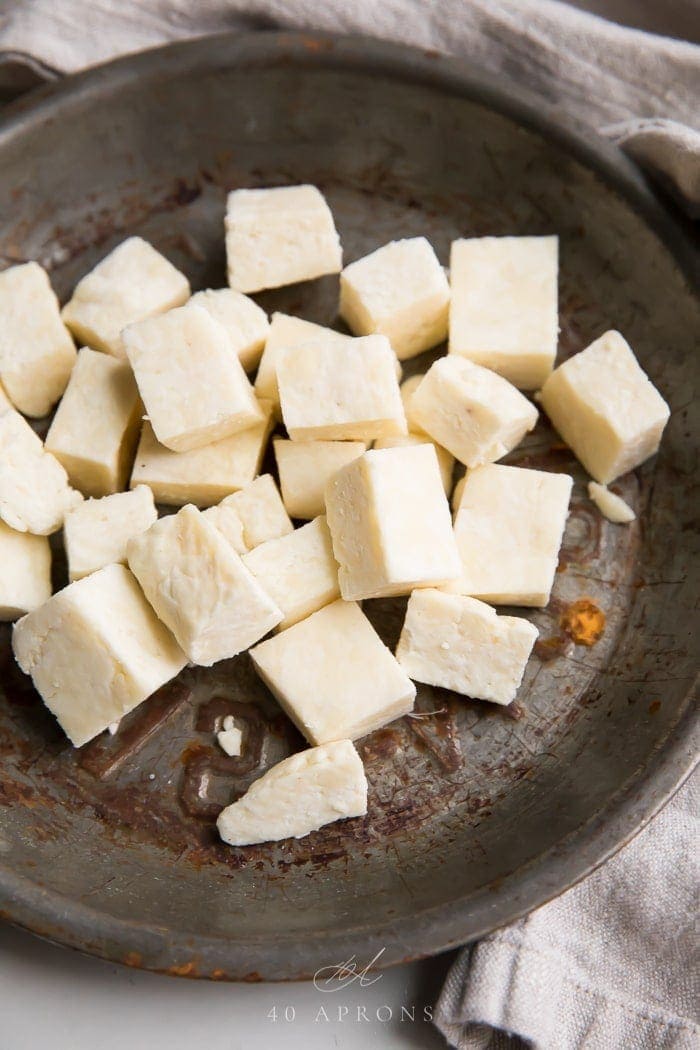
I’m pretty comfortable making this extreme statement: paneer is the best part of Indian food.
And I make a lot of Indian dishes! From my Easy Chana Masala to my Vegetable Korma, to my crazy delicious Restaurant Style Chicken Tikka Masala to my Perfect Naan… I’m a big fan and frequent Indian food cook.
Being married to a Pakistani man, it’s a huge compliment when he loves my recipes better than what we get at the local curry houses or – and don’t tell his family – when he says my version is better than an auntie’s!
And my homemade paneer? He said it was the best he’d ever had in his life. He actually got kind of mad because there wasn’t any left after his second bowl of saag paneer? If that tells you anything.
Why This Homemade Paneer Is So Good
If you’re wondering why you need to know how to make paneer rather than just uh, how to buy paneer, here’s the deal:
- This homemade paneer is the creamiest paneer you’ve ever had. No contest.
- Learning how to make paneer is super easy! And it comes together in about 40 minutes to 2 hours. It only takes about 15 minutes of active time; the rest of the time is the paneer pressing.
- The texture is better than what you’ll get at a restaurant or Indian grocery.
- It’s richer and tastes like melty cheese curds, rather than little hard, dry-ish cubes.
- This homemade paneer is amazing in vegetarian Indian dishes, like saag paneer.
How to Make Paneer
Start by pouring your milk into a large heavy-bottomed pot and placing over medium heat. Bring the milk to just a boil. The milk should produce a layer of bubbly foam on top and smell really rich and fragrant.
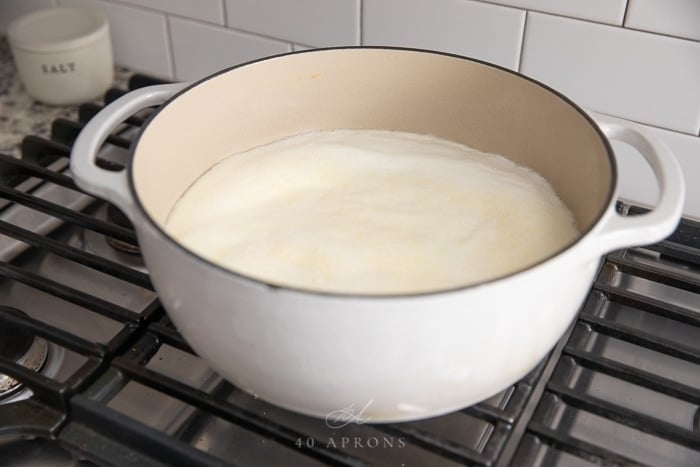
As soon as the milk boils, remove the pan from the heat and stir in the lemon juice. As you stir, the milk should immediately separate into curds and whey: white cottage cheese and yellowy liquid.
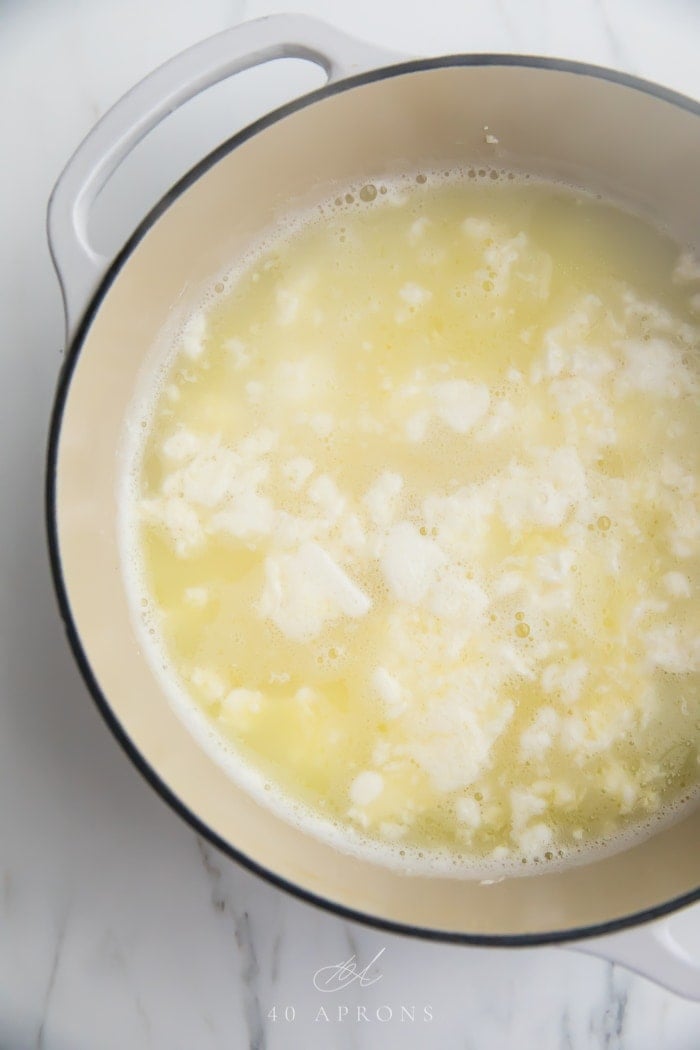
Line a strainer with 2 layers of cheesecloth and pour the curds and whey through. This will leave just the solid white curds. Discard the whey or save it for another use, like lactofermentation or whey beverages.
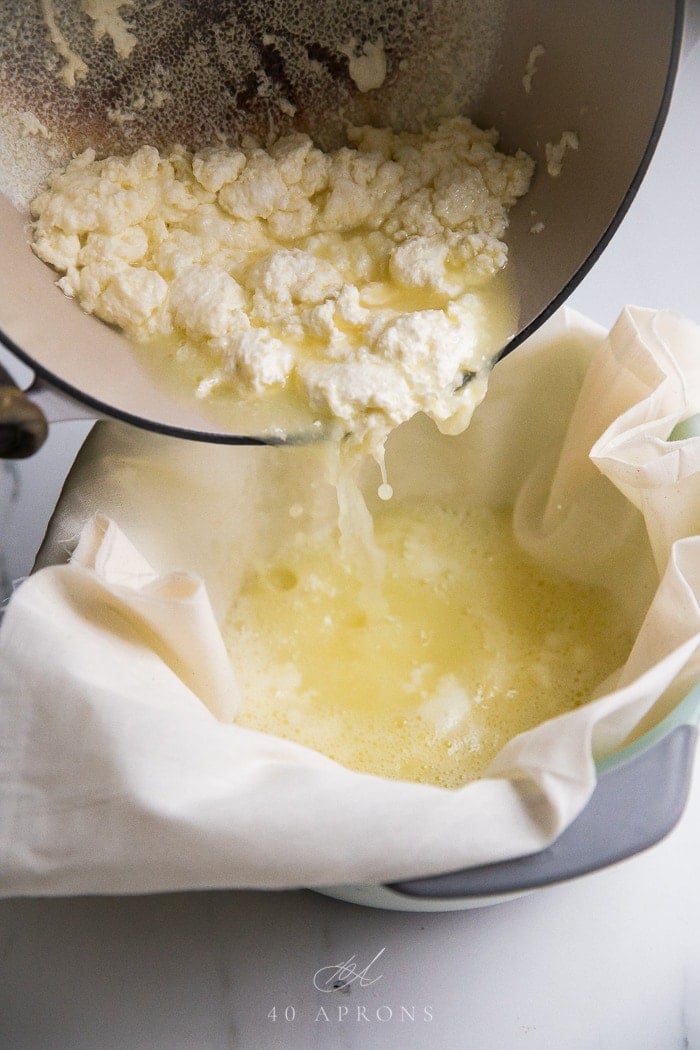
Rinse the curds under running water to reduce any lemon flavor.
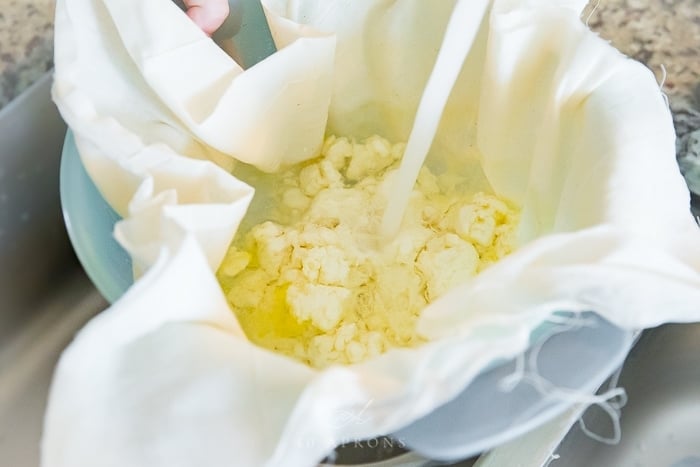
Toss the solid curds with a bit of salt then wrap up in a ball in the cheesecloth and squeeze very tightly to get out as much water as possible.
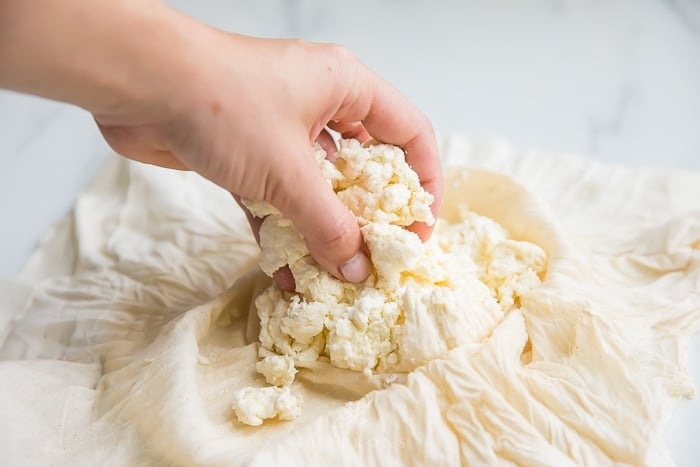
Less water = creamier cheese.
Live it.
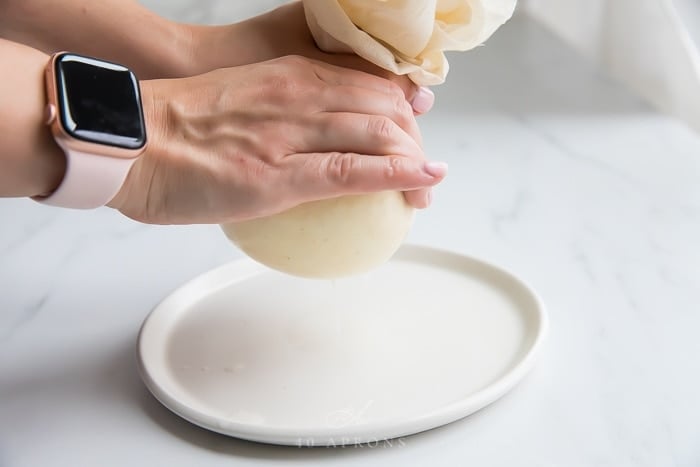
Once you’ve squeezed out as much water as you can, flatten the ball of curds in the cheesecloth into a disc.
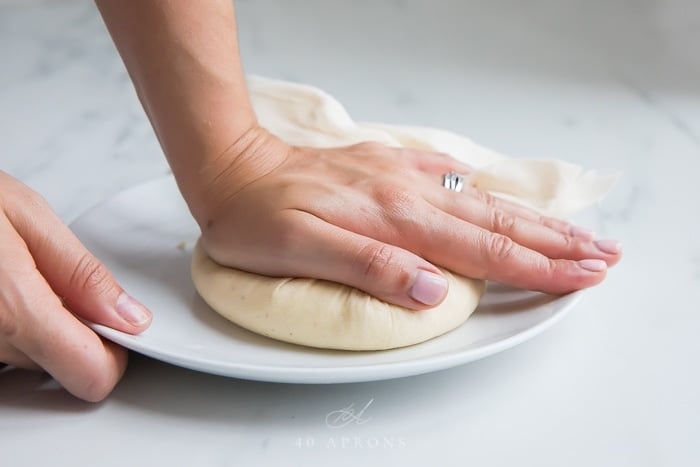
Lay the cheesecloth over the disc as flat as you can get it, to produce the smoothest top. Place a plate on top and weight the top plate down; I use a couple cans. Chill for 20 minutes to 2 hours.
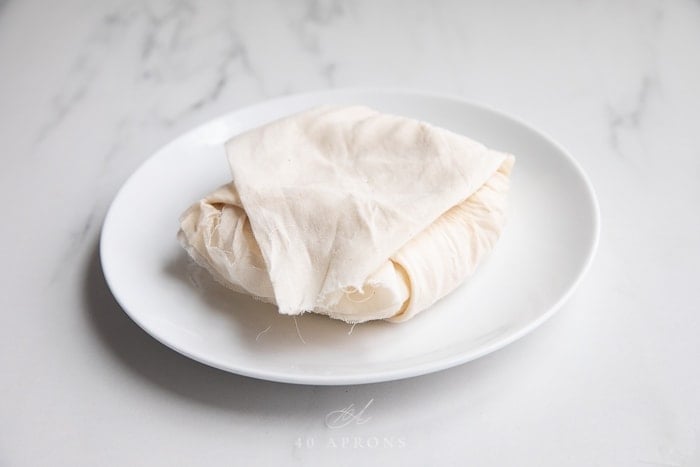
The longer you press, the firmer the cheese. It will still be rich and creamy but it won’t melt into your dish. It will be hard to fry or sauté paneer that has only been pressed 20-30 minutes. I recommend pressing 90 minutes – 2 hours.
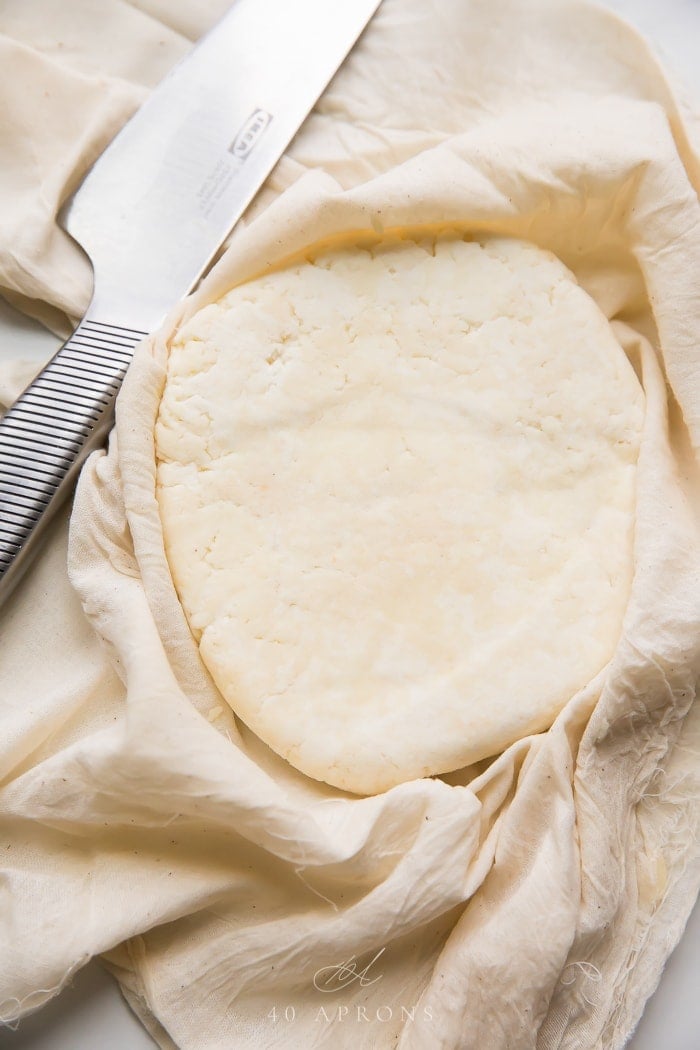
Then, unwrap the paneer, cut into cubes, and you’re done!
Can I use organic milk?
Well… you can, but it cannot be ultra-high temperature pasteurized (UHT), which is a very common process for organic milk. Ultra high temperature pasteurization kills out certain structures in the milk that you need to get them to properly form curds and produce homemade cheese.
I prefer to use local, high butterfat milk for the creamiest, richest paneer ever, and it’s processed at a low temperature. If you can find organic milk that does not undergo ultra high pasteurization, you should be fine.
How long do I have to press the paneer?
You can absolutely press the paneer for just about 20-30 minutes and move on about your life. However, that will result in a meltier cheese, rather than the firm cubes you have at an Indian restaurant. I personally prefer to press my homemade paneer for 1-2 hours to really firm the cheese up without losing any richness or creaminess. This produces a better result for recipes that require frying the paneer first.
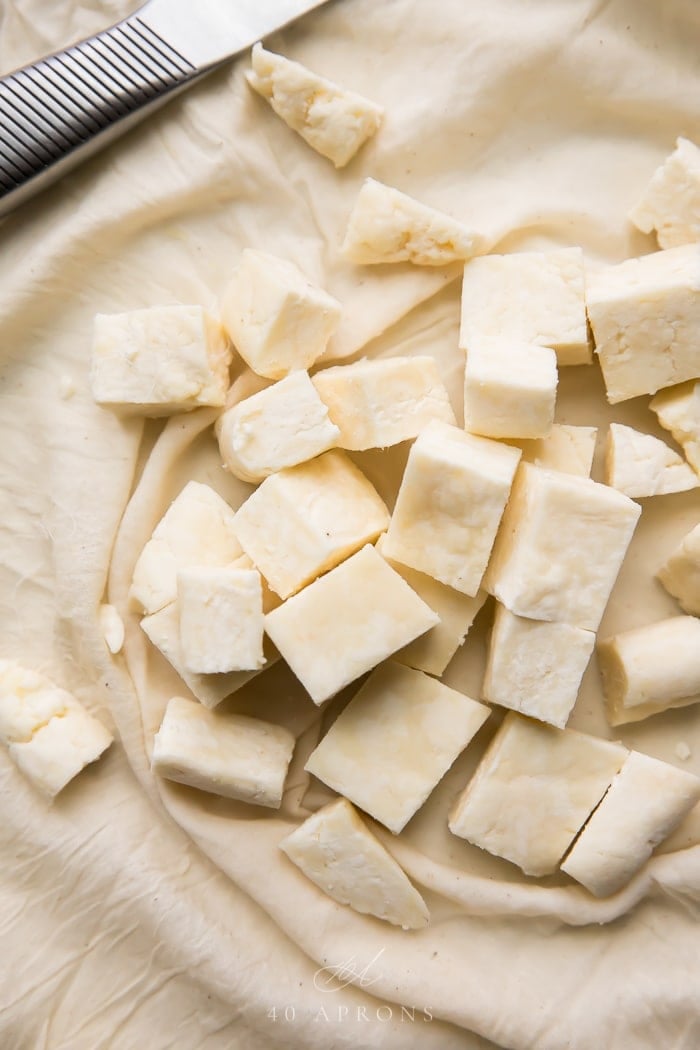
Other Indian Food Recipes You’ll Love:
- Paneer Tikka Masala
- Palak Paneer (Restaurant Style)
- Iced Golden Milk Latte
- Indian Butter Chicken
- Saag Chicken
- Best Instant Pot Chicken Tikka Masala
- Whole30 Chicken Curry
- Whole30 Butter Chicken
- Indian Meatballs with Creamy Sauce
Hey – you’ve made it this far, and now we’re best friends! If you make this recipe, I’d love for you to give it a star rating ★ below. Make sure you follow me on Instagram, Pinterest, and Facebook, too!
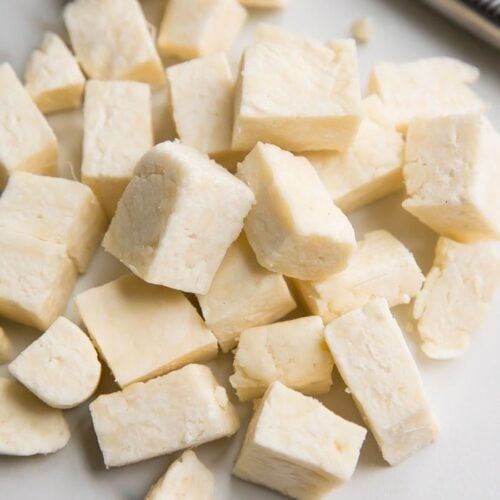
How to Make Paneer (Indian Cheese)
Ingredients
- ½ gallon whole milk not UHT pasteurized. See Note
- 6 tablespoons fresh lemon juice
- 1 teaspoon salt
Equipment Needed
Instructions
- In a large heavy saucepan, heat the milk over medium heat. Bring the milk to JUST under a boil. The milk will produce a steamy, foamy layer on top and will smell rich and fragrant. Stir occasionally, scraping the bottom to make sure it doesn’t burn.
- Remove the pot from the heat and stir in the lemon juice. The mixture will likely curdle immediately into solid white curds and yellow liquid whey, but if it doesn’t, that’s OK. See Note for next steps if your milk does not curdle immediately.
- Line a medium colander with cheesecloth and set over a large bowl. Scoop the white solid curds into the colander and let the liquid whey drain into the bowl beneath. Discard the yellow whey or save for other uses, like lactofermentation.
- Sprinkle the curds with 1 teaspoon salt. Toss the curds with your hands to incorporate the salt.
- Squeeze the curds in the cheesecloth to remove as much excess whey as possible. Still in the cheesecloth, flatten the curds into a disc and arrange the edges of the cheesecloth over the top as smooth as possible. Place a dinner plate on top and weight with 1-2 cans or other heavy item.
- Place in the refrigerator and let press for at least 20 minutes, preferably 90 minutes – 2 hours. The longer the press, the firmer the cheese, without losing any richness. After pressing, unwrap the paneer, cut into cubes, and use in a recipe or keep chilled in an airtight container up to 3-4 days.
Approximate Information for One Serving
Nutrition Disclaimers
Number of total servings shown is approximate. Actual number of servings will depend on your preferred portion sizes.
Nutritional values shown are general guidelines and reflect information for 1 serving using the ingredients listed, not including any optional ingredients. Actual macros may vary slightly depending on specific brands and types of ingredients used.
To determine the weight of one serving, prepare the recipe as instructed. Weigh the finished recipe, then divide the weight of the finished recipe (not including the weight of the container the food is in) by the desired number of servings. Result will be the weight of one serving.
Did You Make This Recipe?
Tag @40aprons on Instagram and be sure to leave a review on the blog post!
Never Miss A Meal!
New Recipes Straight To Your Inbox
A curated selection of our most recent recipes, delivered straight to your inbox once a week.
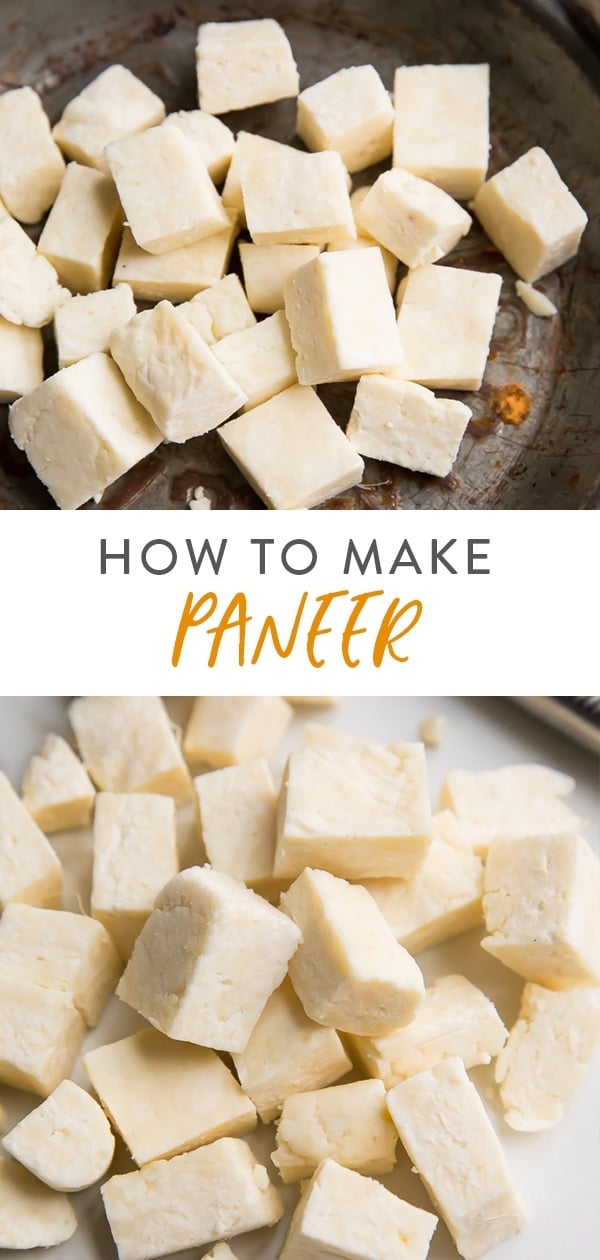
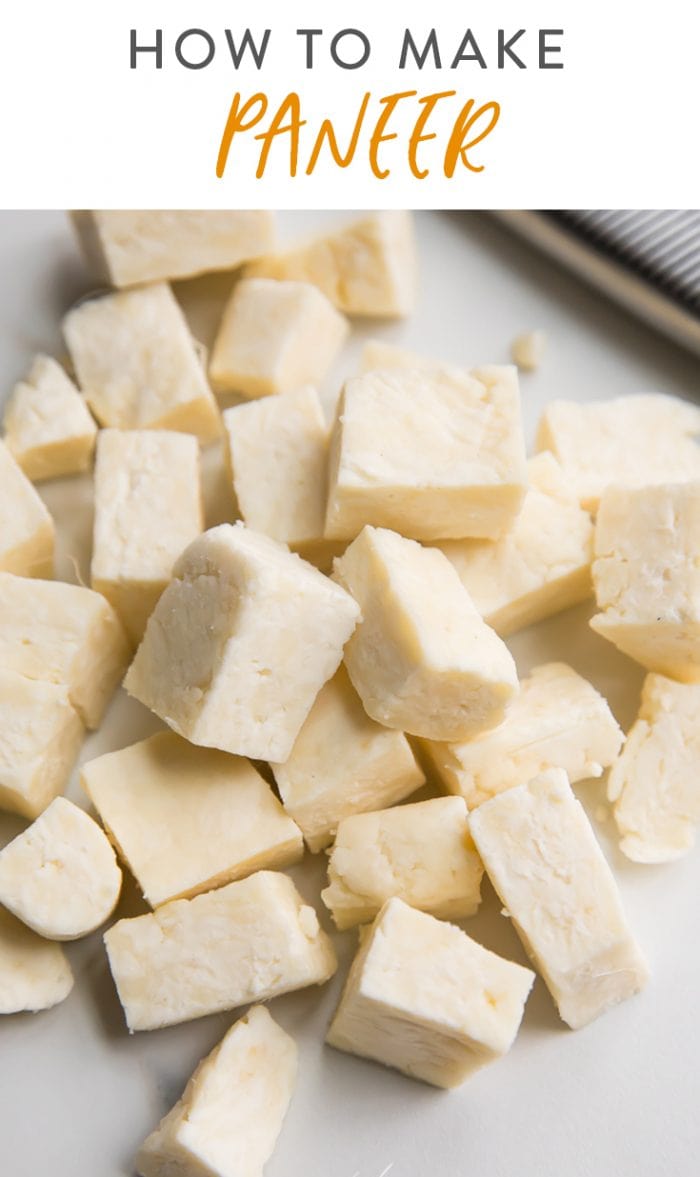
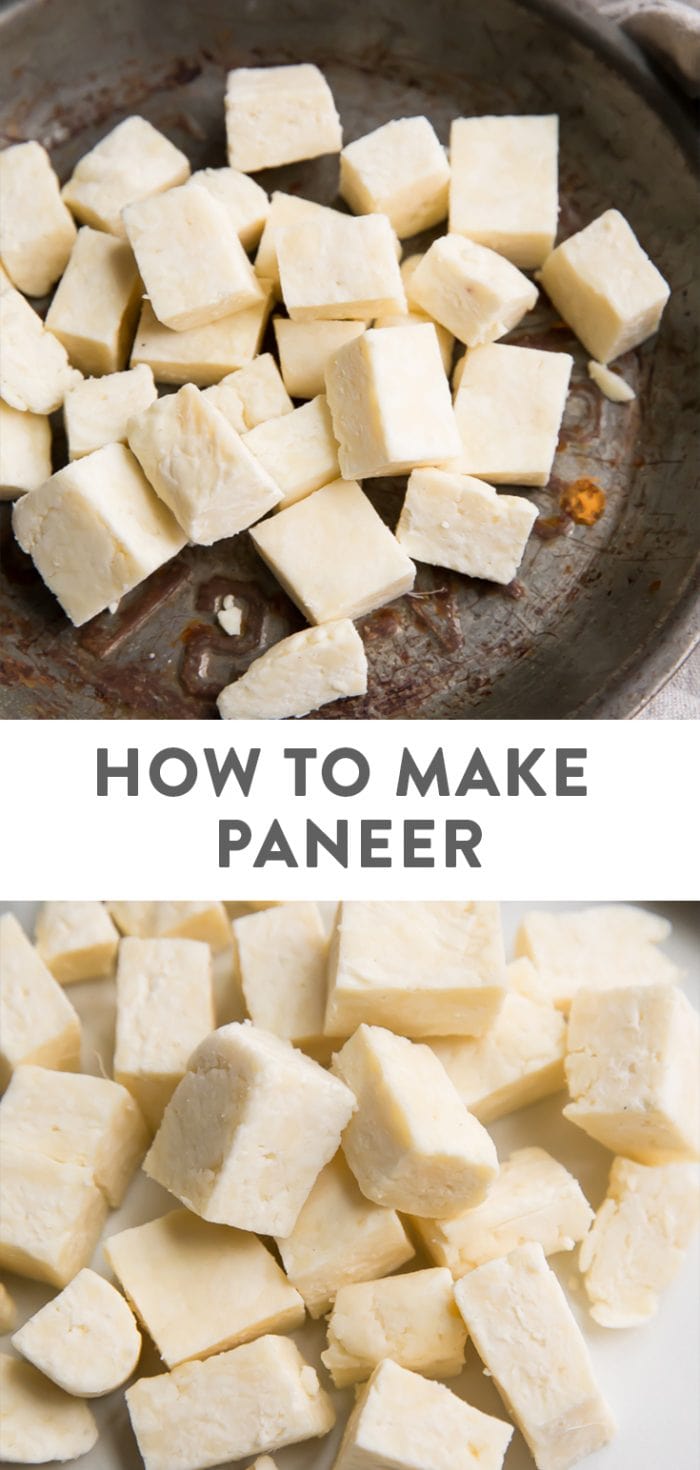
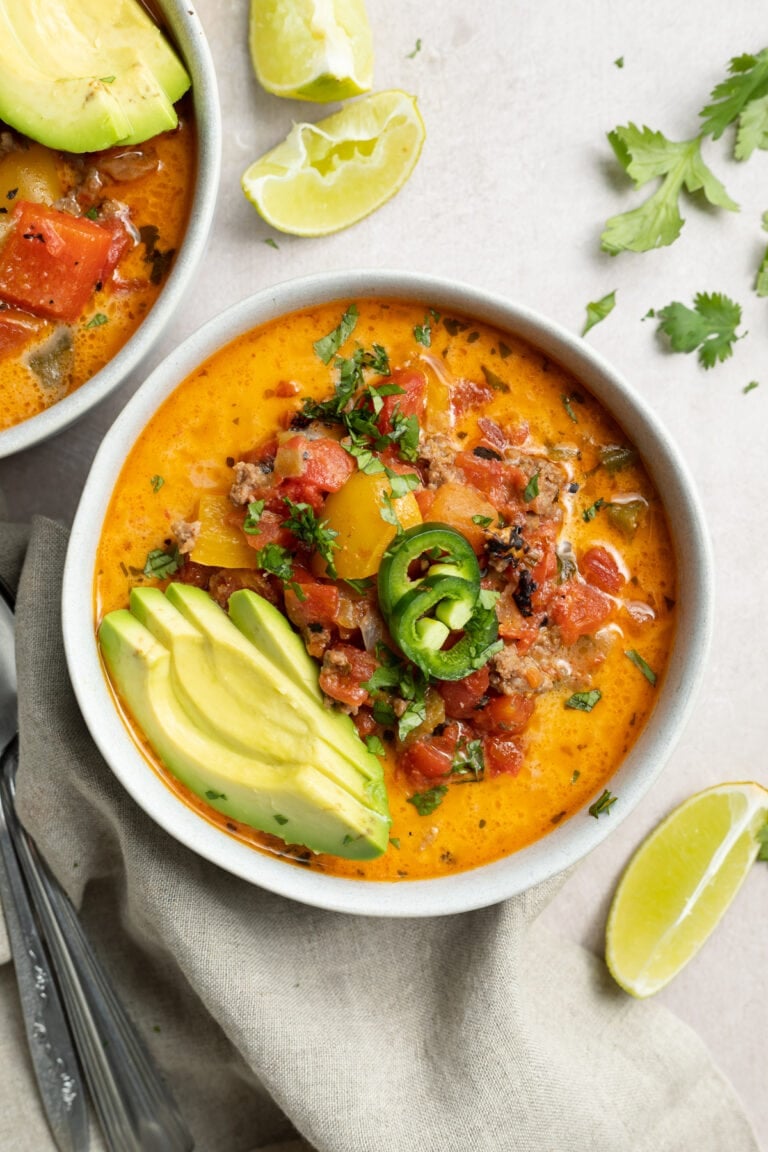
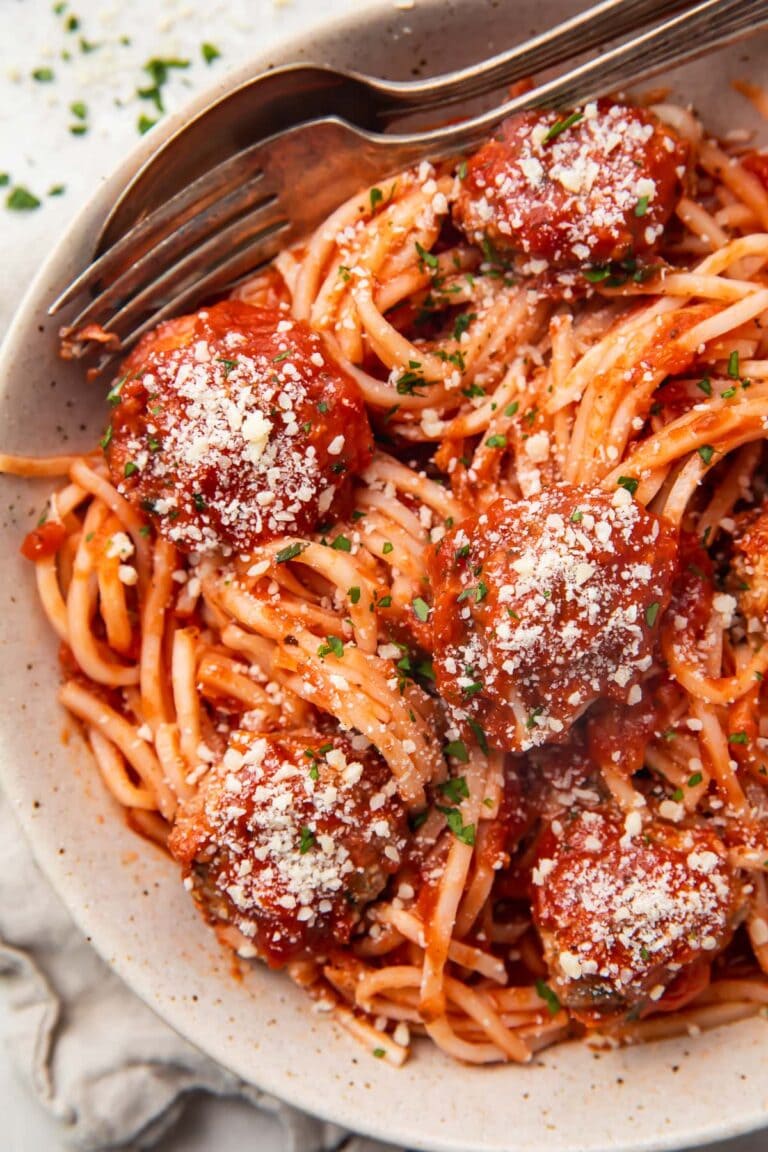
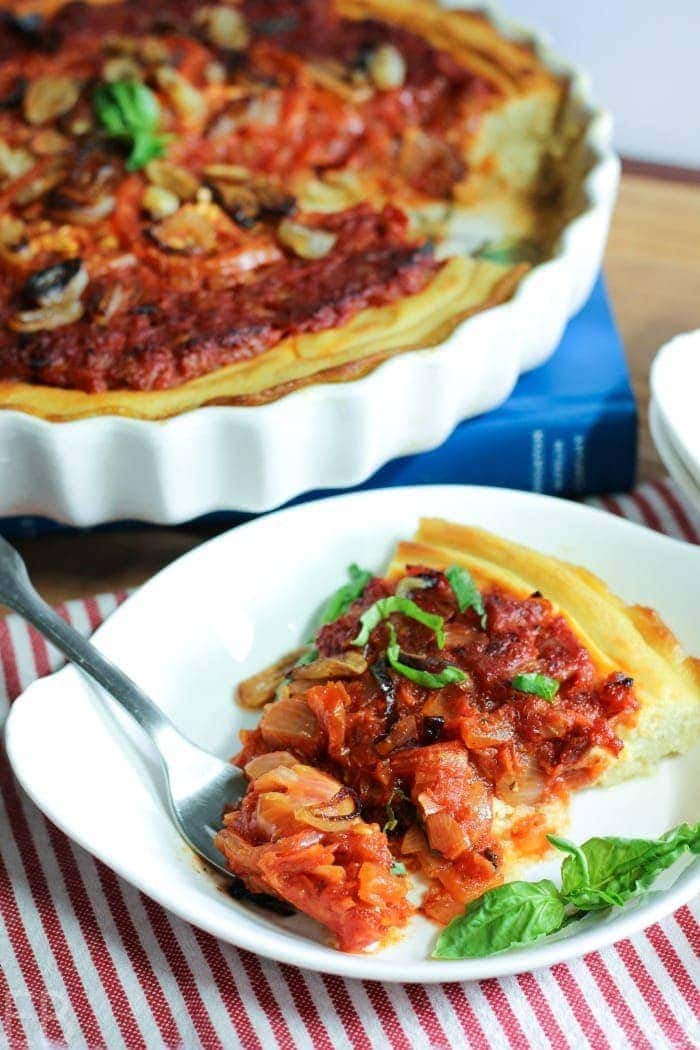
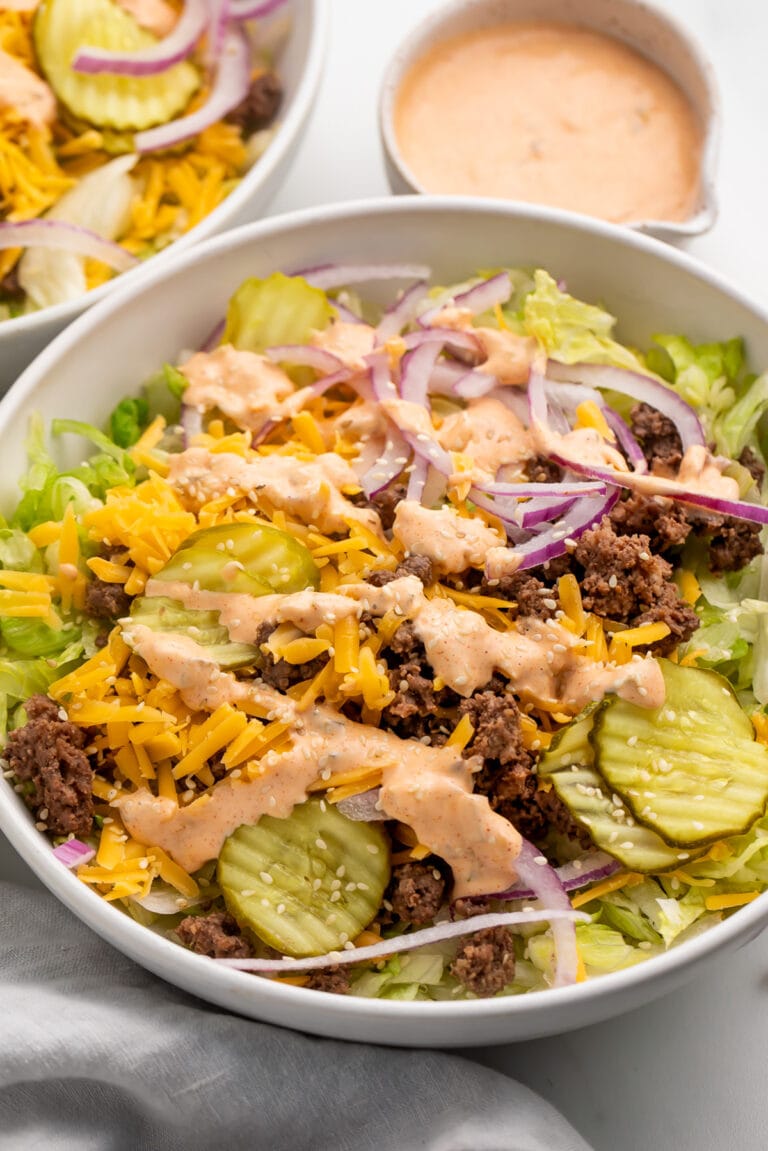
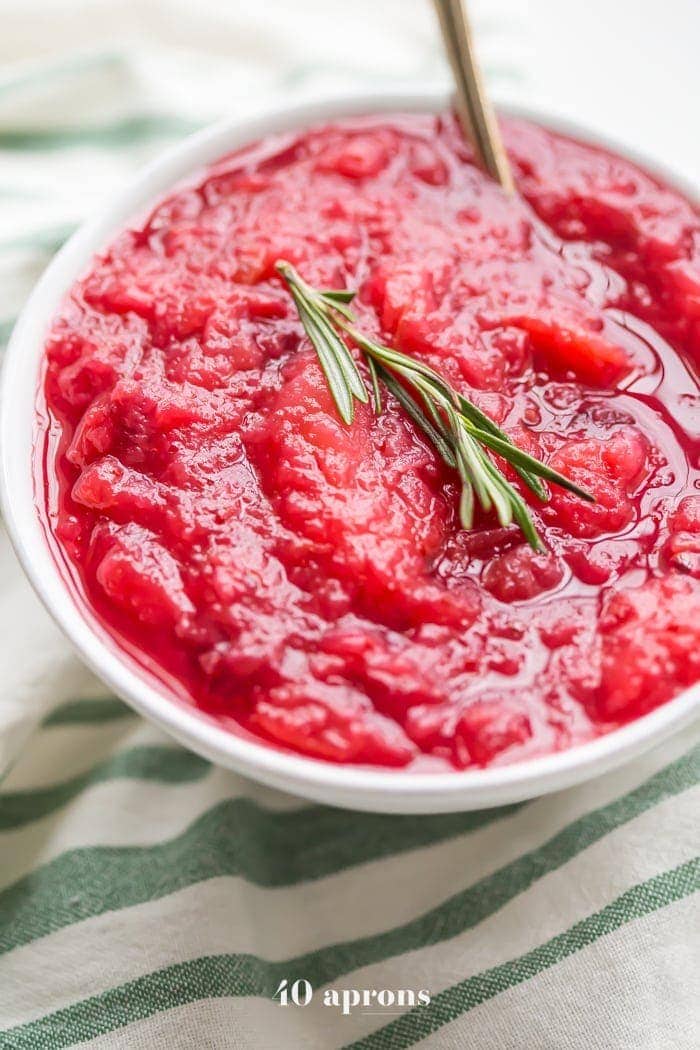
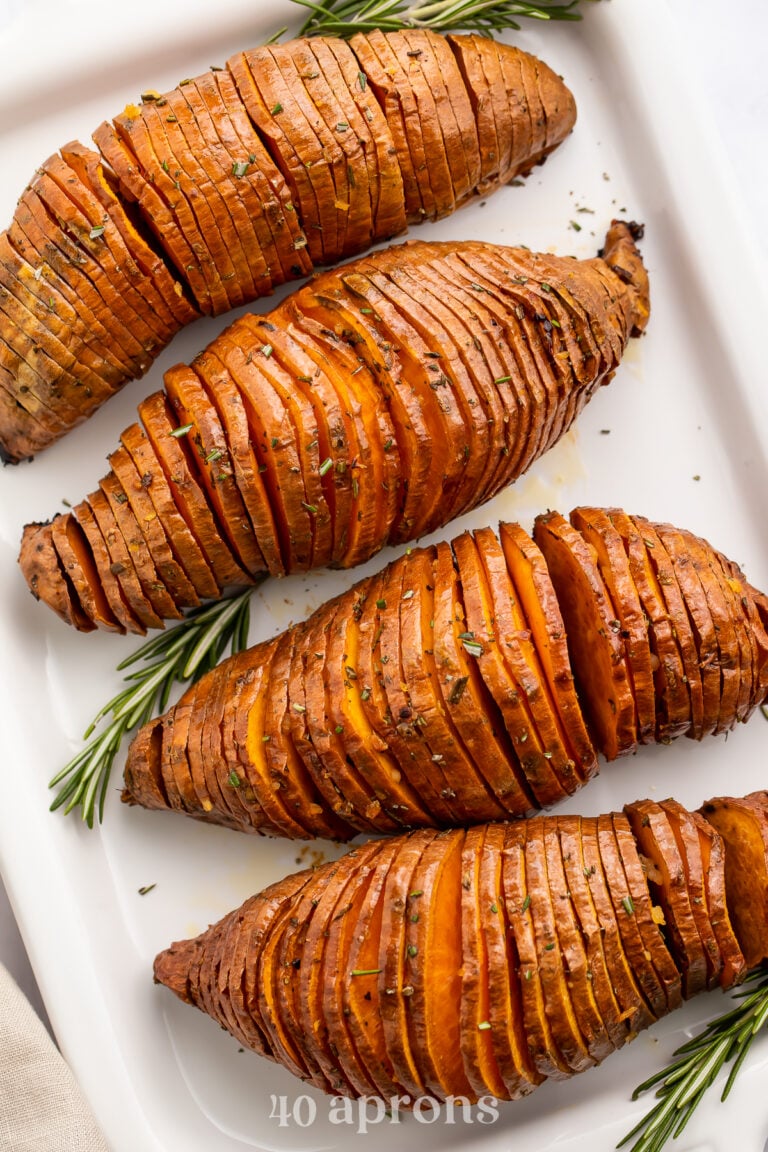










Apparently lactose free milk doesn’t work with this as well as the UHT. Just in case anyone is wondering.
Oh no, we’re so sorry to hear this! Thank you for sharing!
Can you use goat milk instead of cow milk?
I CAN MAKE MY OWN PANEER? I CAN MAKE MY OWN PANEER.
LIFE.
CHANGING.
Life, CHANGED. Seriously though.. it’s like 1/3 of the cost of regular paneer and like 400x better tasting. There is magic yet in this world!
oh my gawd. . you made homemade paneer .. this is why I love you . . and hey, light grey yoga pants might be the next skinny jean craze . . you never know. you probably started the yoga pants fashion craze, yo. 🙂 and as for Indian buffets. . you would be fighting with me for the paneer. love!
I’m totally claiming that as my gift to the world.. and I mean come now, who wears *real pants* to an Indian buffet?! You have to try the homemade paneer, Alice.. you will love it! 🙂
I always make paneer at home…its taste and texture is unmatched! 🙂 Yours look lovely!
Right?! So good. Thanks Manali! 🙂